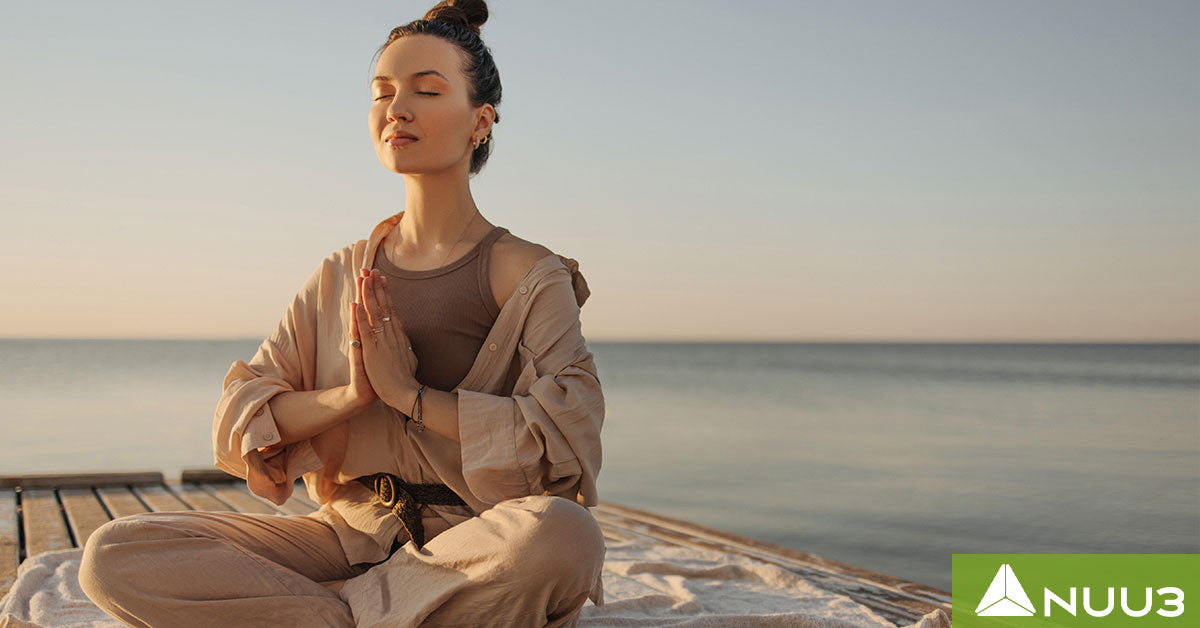Embarking on a journey of spiritual meditation can be both a transformative and enriching experience, offering a pathway to inner peace, self-discovery, and heightened awareness. In today’s society where stress and distractions are abundant, the practice of spiritual meditation provides a safe place for cultivating a deeper connection with oneself. This article will explore the art of spirituality meditation which offers insights, practical tips, and an approach to help those individuals as they embark on this profound exploration of the mind, body, and soul. Whether you seek tranquility, clarity, or a deep sense of purpose, this will be your way into the practice and how to meditate spiritually.
What does spiritual or spirituality mean?
Both "spiritual" and "spirituality" can have various meanings depending on individual beliefs, cultural backgrounds, and philosophical perspectives. Generally, spirituality[1] is recognizing a feeling or even sensing that there is something “greater” than yourself. It is associated with exploring certain aspects of life and overall existence. Furthermore, entering a spiritual journey involves a deeper understanding of oneself and the universe.
Spirituality goes beyond organized religious practices[2] as it can encompass a wide range of personal experiences, beliefs, and practices. However, for some, it may be closely tied to religious traditions, and they may express their spirituality through religion. Others might find spiritual practices in their pursuits without the use of religion.
Practices such as meditation, prayer, contemplation, mindfulness, or engagement in activities that foster a sense of harmony and connectedness are the ways to enhance spirituality. Ultimately, spirituality is a deeply personal and subjective concept, and individuals may define and experience it in unique ways based on their own perspectives and life experiences.
What is Spiritual Meditation?
Spiritual meditation is a practice that involves cultivating a deeper connection with your higher self and tapping into wisdom and guidance that is within you. It often involves progressing through self-discovery, inner transformation, and deepening spiritual awareness. It can also combat stress and anxiety and help improve mental health[3].
In addition, spiritual meditation is an individual experience, and how it manifests for each person is very different. There are a variety of characteristics that people may encounter while on their spiritual journey.
- Absorption or loss of a sense of separateness
- Hearing voices or seeing visions
- Feeling a spiritual presence
- A sense of transcendence ( a state of excelling or going past usual limits)
- A sense of awe
These characteristics can also be a sign of spiritual awakeness. This happens when you can take a step back and “awake” to life with a new sense of being. They may not be easy to go through initially, but experiencing an awakening will improve your life and will further enhance your spiritual journey.
What are the different types of Spiritual Meditation?
There are several different types of spiritual meditation techniques.
-
Chakra meditation: This focuses on your body’s energy centers, known as chakras. This form of meditation aims to balance and align to help heal your mind and body. This method often uses visualization and breathwork which helps you to connect with each chakra.
-
Energy clearing and healing meditation: This form of meditation teaches you to turn bad thoughts and energy into good ones. It also can help manage and cope with stress as well by allowing you to calm down. It helps you cleanse and revitalize energy which can foster emotional and spiritual healing.
-
Transcendental meditation: This form of meditation helps you to become calm, stress-free, and grow within yourself. Transcendental meditation is a technique where you focus on specific mantras, Sanskrit, while meditating which allows the state of restful awareness. It allows you to enter a deep inner peace.
-
Mantra meditation: This type of meditation[4] allows you to focus on one powerful word, phrase, or sentence while you repeat it continuously. The purpose is to create a mantra that serves as an anchor for your attention as you are meditating. Whatever mantra is used will be a powerful tool to induce calmness and cultivate inner peace.
-
Quantum meditation: This form of meditation aims to reconnect with the Divine force or Spirit. Quantum meditation allows you to focus your attention on pure consciousness and inner focus, thus, ensuring you experience a deeper connection with the divine energy surrounding your quantum field. This specific field is the source of all potential in the universe.
-
Kundalini meditation: This spiritual practice focuses on connecting with your inner self. Kundalini meditation can increase your awareness and intention in daily life. It can bring about profound experience and transform your spiritual path.
-
Crystal meditation: This involves using specific crystals to enhance your practice as they are said to hold ancient energy and high vibrations. There are several different crystals, each has its specific use. The most popular crystals are clear crystals, selenite, amethyst, rose quartz, smokey quartz, black tourmaline, and citrine. Each has its impact and can enhance certain aspects such as focus, clarity, and inner peace.
-
Inner light meditation: This meditation focuses on connecting with the inner light within oneself. The aim is to gain greater insight into spirituality and experiences. It will ultimately allow for a deeper connection with yourself and those around you.
What are the spiritual benefits of meditation?
Spiritual meditation is associated with a range of benefits that extend beyond physical and mental health. Adding spirituality into your daily life and understanding that it is a gradual, ongoing process will enhance your life greatly, as it has been linked with better health outcomes[5] overall. These are some of the spiritual benefits of meditation.
- A more balanced sense of being
- Being able to experience deep inner peace
- Embodying a radiating personality filled with love, calmness, and serenity
- Increased awareness
- A strong and truthful sense of who you are
- Being able to uphold well-bonded, nurturing, and fulfilling relationships
- Heightened creativity
- Being able to accept more
- Reduction in unnecessary stress
- Increased self-esteem
- Becoming less reactive and more mindful
- More clarity in your life’s purpose
What are some practical steps to spiritual meditation?
Practicing spiritual meditation is easy to embed in your daily life. It is as simple as finding a quiet spot, practicing breathing, being present, and expressing gratitude for all you have in your life. There are many different ways to exercise your spirituality.
-
Find a Quiet and Sacred space: Begin by choosing a quiet and comfortable space where you won't be easily disturbed. This could be a dedicated meditation area or simply a peaceful corner of a room.
-
Set Your Intention: Before starting your meditation, set a clear intention for your practice. Consider what you hope to achieve or focus on during this session. This intention can guide your meditation and bring purpose to your practice.
-
Get into a Comfortable Position: Sit or lie down in a comfortable position. Ensure that your spine is straight to allow for easy breathing. You can use a cushion or chair for added comfort.
-
Deepen Your Breath: Take a few deep breaths to center yourself. Inhale slowly through your nose, allowing your abdomen to expand, and exhale gently through your mouth. Focus on the sensation of your breath.
-
Cultivate Mindfulness: Bring your attention to the present moment. Notice any sensations in your body, sounds in your environment, and the rhythm of your breath. Let go of thoughts about the past or future, and fully immerse yourself in the present.
-
Connect with Your Higher Self: Turn your attention inward. Connect with your higher self, inner wisdom, or a sense of divine presence. This connection can be a source of guidance, love, and inspiration.
-
Use Affirmations or Mantras: Introduce positive affirmations or a mantra to your practice. Repeat words or phrases that resonate with your spiritual goals. This can help focus your mind and instill a sense of purpose and positivity.
-
Engage in Visualization: Incorporate visualization into your meditation by imagining a peaceful and sacred place, visualize healing light, or picture yourself achieving your spiritual aspirations. Visualization can enhance your meditation experience.
-
Embrace Silence and Stillness: Allow moments of silence and stillness in your meditation. Let go of the need for constant mental chatter. Embrace the quiet space within, allowing a deeper connection with your spiritual self.
-
Express Gratitude: Take a moment to express gratitude for the blessings in your life. Acknowledge the positive aspects and experiences, fostering a sense of appreciation and abundance.
-
Slowly Return to the Present: As your meditation session comes to an end, gently bring your awareness back to the present moment. Gradually become aware of your surroundings, and when you feel ready, open your eyes. Carry a sense of peace and connection with you for the rest of your day.
How to Incorporate Spiritual Meditation into Daily Life?
Integrating spiritual meditation into your daily life often involves incorporating both mindfulness and spiritual practices into your routine. The key is to ensure that it can fit easily into your daily life and that it is also sustainable.
-
Establish a Routine: Set a specific time each day for your meditation practice. Whether it's in the morning, during a lunch break, or before bedtime, having a consistent schedule makes it easier to integrate meditation into your daily life.
-
Start with Short Sessions: Begin with shorter meditation sessions, especially if you're new to the practice. It can be as easy as setting time for five minutes or doing a 10-minute morning meditation. This makes it more manageable to fit into your daily routine. As you become more comfortable, you can gradually extend the duration.
-
Create a Dedicated Space: Designate a peaceful and quiet space for meditation. It could be a corner in your home, a room, or even an outdoor spot. This helps signal to your mind that it's time for your daily meditation.
-
Incorporate Mindfulness into Daily Activities: Bring mindfulness to everyday tasks. Whether it's eating, walking, or doing chores, practice being fully present in the moment. This mindful awareness can extend the benefits of meditation to various aspects of your life.
-
Use Reminder Techniques: Set reminders or alarms on your phone to prompt you to take a few moments for meditation. These reminders can help you stay consistent and prioritize your spirituality throughout the day.
-
Combine Meditation with Other Activities: Integrate meditation into existing activities. For example, you can practice deep breathing while commuting, recite affirmations during a workout, or engage in mindfulness while cooking. This allows you to seamlessly blend meditation with your daily tasks.
-
Choose Guided Meditations: Use guided meditation sessions, especially if you have a busy schedule. Guided sessions provide structure and can be tailored to specific time constraints, making it easier to follow a routine. There are plenty of apps that can be used such as Calm or Headspace that offer guided meditation as well as other features that can enhance your spiritual well-being.
-
Make it a Family or Group Activity: If possible, involve family members or friends in your meditation practice. Creating a supportive environment can encourage everyone to prioritize spiritual well-being together.
-
Reflect and Journal: Take a few minutes each day to reflect on your meditation experience. Consider journaling your thoughts, feelings, and any insights gained. This reflective practice can deepen your connection to the spiritual aspects of your life. This will also allow you to look back when needed for inspiration or a guide to how far you have come.
-
Be Flexible and Patient: Understand that life can be unpredictable, and there may be days when your meditation routine is disrupted. Be flexible and compassionate with yourself. Return to your practice when you can, and acknowledge the flow of daily life.
-
Explore Different Meditation Techniques: Experiment with various meditation techniques to find what resonates best with you. This variety can keep your practice engaging and adaptable to different situations.
-
Add Supplements to your Practice: Try adding Nuu3 Keep Calm Gummies, Nuu3 Immune Plus and Nuu3 Nature’s Superfuel to your regimen. These three products have natural ingredients that can help keep you calm while boosting your immune system thus making it easier to incorporate meditation into your life.
Frequently Asked Questions
Q: How Do I Choose the Right Form of Spiritual Meditation For Me?
A: Choosing the right form of spiritual meditation involves considering your personal preferences, goals, and level of comfort.
Begin by exploring various meditation techniques such as mindfulness or mantra meditation. You can also use this time to reflect on whether you prefer more with breathwork, chakra alignment, or a connection with nature. Consider your spiritual beliefs and choose a practice that aligns with them. Experiment with different forms to find what brings a sense of peace and connection. Finally, pay attention to how each technique affects your mind, body, and spirit.
The key is to select a method that feels natural, enjoyable, and sustainable for you. Trust your intuition and be open to adapting your practice as you evolve on your spiritual journey.
Q: What Challenges and Solutions would I face during Spiritual Meditation?
A: Challenges in spiritual meditation may include difficulty quieting the mind, facing distractions, or feeling impatient. Solutions that can help combat these difficulties involve acknowledging thoughts without judgment, gradually extending meditation durations, and creating a dedicated, quiet space.
Physical discomfort or restlessness may be addressed by choosing a comfortable posture and incorporating gentle movement. Inconsistency in practice could be addressed by establishing a routine and setting reminders. Dealing with unexpected emotions may require acceptance and self-compassion, allowing emotions to arise and pass.
It's common to encounter challenges, but approaching them with patience, flexibility, and self-kindness allows for more resilient and fulfilling spiritual meditation practice. You must regularly reassess and adjust your approach based on evolving needs contributing to a more sustainable and rewarding meditation journey.
Q: What is the best time to meditate?
A: The best time to meditate will vary depending on your personal preferences and lifestyle. Many find early mornings ideal, as the mind is typically calmer and less cluttered. Meditating upon waking can set a positive tone for the day. Others prefer evenings to unwind and release accumulated stress. Many people prefer to meditate during sunrise or sunset as they feel they can harness the natural tranquility of these moments.
Ultimately, the best time is when you dedicate uninterrupted, focused time to your practice. Experiment with different times to discover what aligns with your energy levels and how it can seamlessly integrate into your daily life.
Conclusion
Embarking on a journey of spiritual meditation offers an opportunity for self-discovery, inner peace, and heightened spiritual awareness. Whether you choose to practice in the tranquility of the morning, the serenity of the evening, or any moment that aligns with your daily routine, the key lies in consistency and a genuine connection with your chosen meditation form. Challenges may arise, but embracing them with patience, flexibility, and self-compassion, you pave the way for a more resilient and fulfilling practice. Remember, the best time to meditate is the time that resonates most with your unique preferences and lifestyle, fostering a harmonious integration of spiritual meditation into your daily life. As you explore and adapt your practice, you embark on a transformative journey toward a deeper understanding of self and the boundless spiritual dimensions that await discovery.










